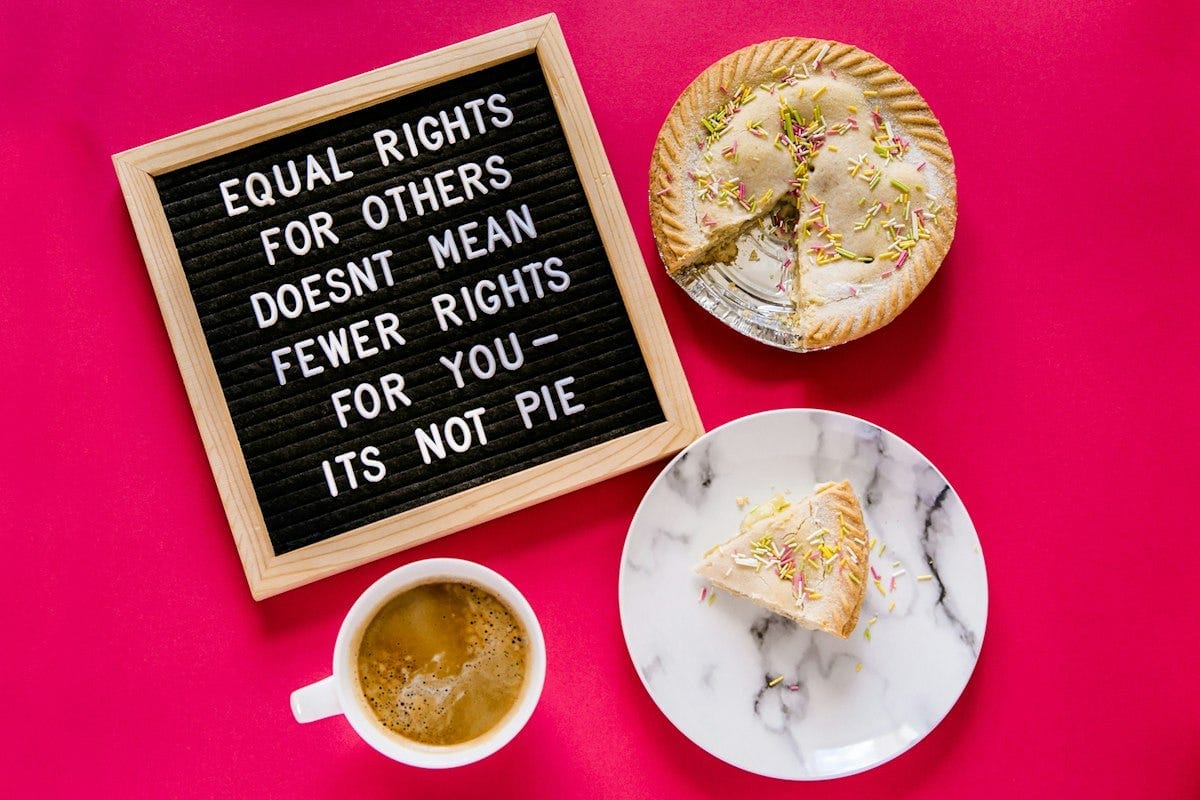Favoritism, Freedom, and God’s Desire of Justice for All

Hey! I’ve been fighting off a stomach bug this week but didn’t want to leave this community hanging without new content. This week’s post is a throwback from a lesson I taught at a church I was a part of while living in Atlanta, GA in 2021. I hope y’all enjoy it!
James 2:1-13 (NRSVUE)
Warning against Partiality
2 My brothers and sisters, do not claim the faith of our Lord Jesus Christ of glory while showing partiality. 2 For if a person with gold rings and in fine clothes comes into your assembly, and if a poor person in dirty clothes also comes in, 3 and if you take notice of the one wearing the fine clothes and say, “Have a seat here in a good place, please,” while to the one who is poor you say, “Stand there,” or, “Sit by my footstool,” 4 have you not made distinctions among yourselves and become judges with evil thoughts? 5 Listen, my beloved brothers and sisters. Has not God chosen the poor in the world to be rich in faith and to be heirs of the kingdom that he has promised to those who love him? 6 But you have dishonored the poor person. Is it not the rich who oppress you? Is it not they who drag you into the courts? 7 Is it not they who blaspheme the excellent name that was invoked over you?
8 If you really fulfill the royal law according to the scripture, “You shall love your neighbor as yourself,” you do well. 9 But if you show partiality, you commit sin and are convicted by the law as transgressors. 10 For whoever keeps the whole law but fails in one point has become accountable for all of it. 11 For the one who said, “You shall not commit adultery,” also said, “You shall not murder.” Now if you do not commit adultery but you murder, you have become a transgressor of[a] the law. 12 So speak and so act as those who are to be judged by the law of liberty. 13 For judgment will be without mercy to anyone who has shown no mercy; mercy triumphs over judgment.
Introduction:
At the heart of our passage is the Apostle James addressing the sin of favoritism. Depending on your translation, James 2:1 either commands to show no favoritism or partiality. What’s important for us to remember is that closely tied to both of those words are the terms:
- Bias
- Privilege
- Prejudice
- Injustice
In light of this these connotations we can justifiably say James 2:1 commands,
“do not show bias, do not show privilege, do not show prejudice, do not show injustice.”
For most, if not all, of us terms like bias, privilege, prejudice, or injustice creates feelings of discomfort or anger. That’s because since it’s inception America is a land built on the sin of favoritism. From Columbus to the present America’s favoritism has taken the form of economic inequality and racism.
For some of us we feel discomfort or even shame over the advantages we’ve been afforded by favoritism. Others of us feel anger or bitterness toward a system that’s been rigged to disadvantage us and navigate a world of inequality and prejudice. The worst part of this tragedy is that the favoritism of greed and racism is just as rampant in our churches as it is in our culture.
Though James explicitly addresses economic favoritism, his main points apply just as much to favoritism based on race. Whether we have benefited or have experienced the pain of this sin God’s word has something to say to all of us.
If you hear nothing else from me today I want you to hear this, “James 2:1-13 teaches us that in Christ we are freed to recklessly pour ourselves out for the good of one another.”
Don’t show favoritism toward people based on economic status…or race. Verses 1-6
Verses 1-6 give us two reasons why we are commanded not to show favoritism.
Reason 1: Partiality creates an us vs. them hierarchy that is rooted in evil. Throughout our history we’ve corporately seen this play out through things like:
Calling African Americans 3/5 of a man, while their white counterparts were deemed fully human.
Justified the genocide of Indigenous People in the name of “Manifest Destiny”
In just the last few years an American President labeled all Mexicans rapists and drug dealers.
We don’t only create hierarchies corporately, we also do this individually with things like:
When we enter into spaces and immediately look for the most influential person in the room and make it a priority to get proximity to them in the hope it’ll lead to our personal benefit.
When we enter spaces and immediately distance ourselves or avoid those we don’t think provide us any personal benefit. This posture is literally prejudice (pre-judging) people based on our assumptions of their value.
- Reason 2: Favoritism is evil because it distorts the image of God in those we advantage and disadvantage.For the advantaged we teach them to think more highly of themselves than they ought to. While the disadvantaged are taught to view themselves lower than they ought. Earlier in this same letter James addresses how to deal with distortions created by economic differences. James 1:9-10 says,
9 Let the brother or sister of humble means boast in having a high position 10 and the rich in having been humbled, because the rich will disappear like a flower in the field. (NRSVUE)
The solution to reversing favoritism is obedience to the Great Command. (Verse 7-11)
In verses 7-11 James shares how favoritism always backfires on the disadvantaged. He shares in verse 7 that when we show favoritism to those who are privileged it leads to increased disadvantage for the less privileged. Favoritism can only beget more division and inequality.
This is important because the solution we are given isn’t simply those with favor get their privilege or favoritism taken away and those who’ve been disadvantaged now receive those benefits. This solution would only reshuffle the deck and change who is treated unjustly. What God is after is true equality that can only come through the “law of freedom.”
We see that the law of freedom in verse 12;
So speak and so act as those who are to be judged by the law of liberty.
Notice that this ‘law’ is rooted in Christ’s Great Command quoted in verse 8. We are to love God and to love our neighbors as ourselves. The law here is not a judicial law where a country or government can enforce a penalty for not following it. The way James is using law is as a universal truth. His use is more like our understanding the law of gravity.
The solution in God’s economy is a freedom for both the advantaged and disadvantaged to recklessly pour themselves out for the good of one another.
Live as those who will be judged under the law of freedom. Verses 12-13
The last point serves as a warning to us. James teaches that favoritism is walking in judgement not mercy. We have the choice to either walk in judgement without mercy, or to walk in mercy without judgement, whichever path we choose is how we’ll be judged.
Conclusion:
You may be thinking, “I hear what James is saying, what am I supposed to do about favoritism?” That’s a great question. We’ve heard “why” favoritism is sin;
- Because it’s divisive
- Rooted in evil.
- Tramples on the image of God for those who are less privileged.
We have learned that we stand against favoritism through living out the Great Command. But the question remains, what does this look like practically? The answer is we follow in the footsteps of Christ and tangibly walk the path Jesus has paved for us.
Ultimately, James’ point is not primarily about rebuking favoritism for the sin it is. His point is to call out the sin in order to call Gods people to live in the law of freedom and pursue genuine equity for all.
Because, “in Christ we are freed to recklessly pour ourselves out for the good of one another.” The last point serves as a warning to us. James teaches that favoritism is walking in judgement not mercy.
We have the choice to either walk in judgement without mercy, or to walk in mercy without judgement…whichever path we choose is how we’ll be judged.




